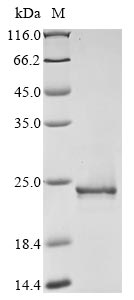Recombinant Clostridium symbiosum Pyruvate, phosphate dikinase (ppdK) is produced in E. coli and includes both an N-terminal 10xHis tag and a C-terminal Myc tag for straightforward purification and detection. This partial protein covers amino acids 384 to 511 and is purified to over 90% homogeneity, as confirmed by SDS-PAGE. The product is designed solely for research use and appears to offer reliable quality and consistency for experimental applications.
Pyruvate, phosphate dikinase plays a critical role in metabolic pathways by catalyzing the conversion of pyruvate to phosphoenolpyruvate. This enzyme is integral to energy metabolism and carbon fixation processes, which makes it a crucial component of research into microbial metabolic pathways and enzymatic regulation. Understanding its function and mechanics seems vital for studies in bioenergetics and microbial physiology.
Potential Applications
Note: The applications listed below are based on what we know about this protein's biological functions, published research, and experience from experts in the field. However, we haven't fully tested all of these applications ourselves yet. We'd recommend running some preliminary tests first to make sure they work for your specific research goals.
Clostridium symbiosum Pyruvate, phosphate dikinase (ppdK) is a bacterial enzyme that requires precise folding and proper domain interactions for its functional activity in the phosphoenolpyruvate synthesis pathway. The E. coli expression system is homologous for this bacterial protein, increasing the probability of correct folding. However, this recombinant protein represents only a partial fragment (384-511aa) of the full-length enzyme, which may lack complete structural context and functional domains. The dual N-terminal 10xHis-tag and C-terminal Myc-tag may sterically interfere with the protein's folding or functional sites. While bacterial expression provides favorable conditions, the partial nature of the construct requires experimental validation to confirm structural integrity.
1. Antibody Development and Immunoassay Research
This application is highly suitable as antibody development primarily relies on antigenic sequence recognition. The partial fragment provides specific epitopes within the 384-511aa region, making it excellent for generating antibodies targeting this particular domain. The dual tags facilitate purification and provide additional epitopes for antibody validation.
2. Protein-Protein Interaction Studies
This application carries a significant risk due to the partial nature of the protein. Protein-protein interactions require proper tertiary structure that may be compromised in this partial fragment. If correctly folded (verified), the fragment might identify domain-specific interaction partners. If misfolded/unverified, there is a high risk of non-specific binding or failure to present genuine interaction interfaces.
3. Epitope Mapping and Structural Domain Analysis
Domain analysis focuses on local structural features rather than complete protein functionality. This application is well-suited for characterizing the structural properties of this specific domain. Techniques like limited proteolysis and cross-linking can map domain boundaries and structural features regardless of full protein context.
4. Comparative Biochemical Analysis
Comparative analysis of defined domains can provide insights into the evolutionary conservation of structural features. This application is suitable for comparative studies of this specific domain across species. The standardized expression allows consistent preparation for comparing thermal stability and biochemical properties of the 384-511aa region.
Final Recommendation & Action Plan
The E. coli expression system is suitable for this bacterial protein fragment, but the partial nature of the construct requires careful consideration of the application scope. Begin with biochemical characterization to assess folding quality through techniques like circular dichroism spectroscopy and size-exclusion chromatography. Application 1 (Antibody Development), Application 3 (Epitope Mapping), and Application 4 (Comparative Analysis) can proceed immediately as they don't require full protein functionality. For Application 2 (Protein-Protein Interactions), first validate that the fragment maintains proper folding and then proceed cautiously with appropriate controls. Focus on domain-specific studies rather than full protein functionality, and use this reagent primarily for structural and immunological applications rather than complete enzymatic function studies.






